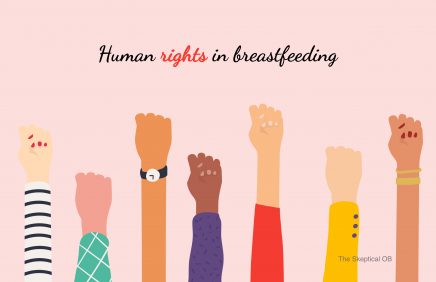
What would it look like if midwives and lactation consultants cared about human rights in breastfeeding as much as they care about human rights in childbirth?
I consulted the paper Human rights in childbirth, narratives and restorative justice: a review to find out.
The authors identify five critical rights encapsulated in the FREDA principle:
The over-medicalization of breastfeeding is ‘lactation violence.’
… The FREDA principle, is a useful human rights summary of the core issues at stake – fairness, respect, equality, dignity and autonomy.
Those goals — fairness, respect, equality, dignity and autonomy — apply equally to breastfeeding.
Fairness requires bringing back well baby nurseries and ending mandated rooming in.
Respect applies to women’s decisions regarding formula supplements, pacifiers and decisions NOT to breastfeed.
Equality means ending the privileging of lactation professionals’ views over patient views.
Dignity means requesting permission to provide lactation care, awaiting permission to touch women’s breasts and making sure that women get enough rest to recover from childbirth.
Autonomy means it’s her baby, her body, her breasts, HER choice.
There are other factors in common, as well.
Factory line conditions in healthcare facilities
Women who receive care from factory line conditions within health facilities are experiencing disrespect and abuse worldwide. Factory line conditions includes care … where women are made to adhere to routine protocols without consent i.e., to lie on delivery tales for hours without freedom of movement, forced to give birth while lying flat on their backs or in stirrups, routinely administering intravenous lines without medical need and episiotomies as of routine.
Similarly, women subject to factory line conditions in breastfeeding care are experiencing disrespect and abuse. Such conditions include women being made to adhere to routine protocols without consent, i.e. forced to be seen by lactation consultants, forced to room in with the baby 24/7, and deprived of well baby nurseries. Their rights are denied in relation to decisions over their body, self-determination and freedom from guilt and shame.
Over-medicalization
The WHO has recognised that childbirth has become over-medicalised particularly in the case of low risk pregnancy and that the caesarean section rate worldwide is much higher than it needs to be. The over-medicalisation of childbirth without informed consent has been also termed from a human rights perspective as ‘Obstetric Violence’.
Breastfeeding has also become over-medicalized, particularly in the case of term babies where the benefits of breastfeeding in industrialized countries are trivial. Over-medicalization includes forced instruction in breastfeeding, mandated periods of skin-to-skin care, brutal pumping regimens to boost supply and artificial supplemental feeding systems. Furthermore the rate of surgical frenotomy to correct purported tongue and lip ties has exploded and is much higher than it needs to be.
The over-medicalization of breastfeeding could be termed: ‘Lactation Violence.’
How have we gotten to the point where lactation violence has become a significant problem?
A technocratic model of breastfeeding
Contemporary healthcare is now being driven by a technocratic model … guided by risk, cost and fear, at the expense of personalised care. Accordingly, patients can feel “tyrannised when their clinical management is inappropriately driven by algorithmic protocols, top-down directives and population targets.” Consequently, in some cases, evidence based medicine can be a shackle to a woman’s autonomy.
Contemporary lactation care is driven by a technocratic model guided by claims of risks of formula, costs of not breastfeeding and fear of being a “bad mother.” Women are tyrannized when their clinical management is inappropriately driven by “Baby Friendly” algorithmic protocols, top-down directives and population breastfeeding targets. Consequently, “evidence based medicine” about breastfeeding shackles women’s autonomy.
Insensitivity of healthcare providers
Sometimes health providers simply do not realise that they have lost their compassion through insensitivity caused by working in some healthcare systems. This can also true for the nursing and midwifery profession and therefore it is important to avoid unintentional blindness of any health provider to dehumanised aspects of industrialised healthcare.
This can also be true for lactation consultants.
How can we address the harms that lactation violence causes?
Restorative justice
The key objectives of the process would be to repair the harm suffered by the victim; person at fault becomes aware of that his actions are unacceptable and the effect his actions are having on the victims and community; acknowledging responsibility for actions; participate in reparation decision making moving forward …
The key objectives for lactation consultants would be to repair the harm suffered by women, gain awareness of the impact their actions are having on babies and mothers (exclusive breastfeeding has become the leading risk factor for newborn re-hospitalization, breastfeeding guilt and exhaustion are factors in postpartum anxiety and depression), take responsibility for their actions and commit to doing better in the future. Most importantly, WOMEN would participate in decision making around breastfeeding care.
The author concludes:
Human rights in childbirth has served as a forum for highlighting many untapped or repressed areas of rage, anger and conflict within maternity care. Will this contemporary form of feminist rebellion against dehumanised healthcare lead to transformation of institutional attitudes? …
I heartily agree.
Human rights in breastfeeding serves to highlight feelings of anger, powerlessness and conflict with lactation care. A feminist rebellion against over-medicalized breastfeeding promotion could transform institutional attitudes. The way forward must be a joint effort between lactation consultants and the women they serve.
Anything else is lactation violence.

